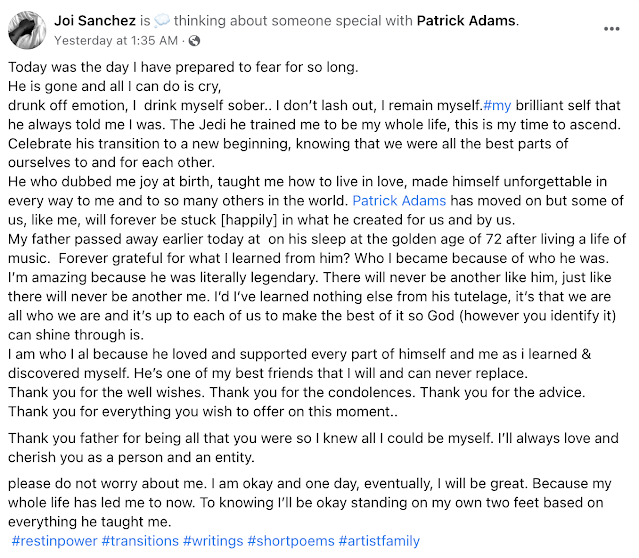 |
| Photo Credit: Red Bull Music Academy |
Adam's daughter Joi Sanchez announced the composer's death in a social media post.
"My father passed away earlier today at on his sleep at the golden age of 72 after living a life of music," she wrote. "Forever grateful for what I learned from him? Who I became because of who he was. I’m amazing because he was literally legendary."
A musical renaissance man, Adams earned 32 gold and platinum records during a career that began in the 1960s and spanned decades and genres.
Born in 1950, the New York City native got an early start in music. Already an accomplished songwriter, instrumentalist and budding engineer — he joined the Harlem band the Sparks as a 16-year-old. The group was signed to Curb/MGM and played shows with acts like the Commodores and Jerry Butler.
By 1970 Adams had been hired as the vice president of A&R for New York-based Perception/Today Records, after discovering and signing the teenage R&B trio Black Ivory in 1968. The group's first single, powered by the vocals of lead singer Leroy Burgess, peaked at No. 38 on Billboard's R&B chart in 1971.
His success as a manager was quickly eclipsed by his highly coveted work as a producer. Adams eventually started his own production company focused on dance — Patrick Adams Productions Music and went on to produce and arrange music for some of the biggest disco, R&B and hip-hop acts of the 70s and 80s.
#ripPatrickAdams One of my favorite #composer #producer #musicians and #people.
— Nile Rodgers (@nilerodgers) June 22, 2022
The world of music owes you so much. pic.twitter.com/WmDhZKGvhT
Gladys Knight, Candi Staton, Keith Sweat, Salt-N-Pepa, Eric B & Rakim, Loleatta Holloway, Sister Sledge and Eddie Kendricks, are just a few of the artists and icons who the arranger and composer elevated with his work. His songs have been heavily sampled by some of hip-hop's greatest rappers including Kanye West, Nas and Wu-Tang Clan.
In 2017 Red Bull Music Academy honored his work and its impact on the music industry with a celebration in New York that worked to shed more light on his then mostly overlooked legacy.
“You can tell a Nile Rodgers record a million miles away because it has an imprint that emanates from his guitar,” he told Red Bull Music Academy. “In my case I tried to avoid that. I didn’t want my records to sound the same. Whether that was a positive thing or a negative thing, I don’t know. But at the same time there is a signature in my music—sometimes it’s harmonic, and sometimes it’s just in the quirkiness of things. And sometimes you just don’t hear it until somebody points it out to you and asks, ‘Oh, he did that record too?’”


No comments:
Post a Comment